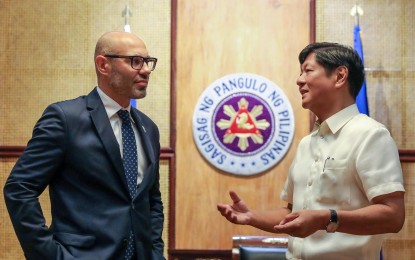
POSSIBLE AGREEMENT. President Ferdinand R. Marcos Jr. and Permanent Court of Arbitration Secretary General Marcin Czepelak hold a meeting at Malacañan Palace in Manila on Thursday (Aug. 29, 2024). During the meeting, Czepelak expressed his intent to establish a host country agreement with the Philippines. (Photo from the Presidential Communications Office)
MANILA – Permanent Court of Arbitration Secretary General Marcin Czepelak on Thursday expressed his intent to forge a host country agreement with the Philippines to facilitate the international court’s hearings in the country.
Czepelak pitched the plan during his courtesy call on President Ferdinand R. Marcos Jr. at Malacañan Palace in Manila, Communications Secretary Cheloy Garafil said in a statement.
“Czepelak expressed interest in exploring the potential for establishing a Host Country Agreement with the Philippines to facilitate PCA hearings within the nation,” Garafil said.
Under a host country agreement, the host country and the PCA will establish a legal framework for the conduct of future PCA-administered proceedings in the territory of the host country on an ad hoc basis, without the need for a permanent physical PCA presence in that territory.
A PCA facility may also be established in the territory of the host country.
Garafil said Czepelak met with Marcos as a custom for PCA officials to visit contracting parties to promote the international tribunal’s dispute settlement mechanisms.
“His visit offers a valuable opportunity to highlight the Philippines’ commitment to international law, peaceful dispute resolution, and the PCA, as well as to congratulate the Arbitral Court on its 125th anniversary,” she said.
“Czepelak noted the Philippines’ substantial contributions to the organization, especially with its current presidency of the PCA Administrative Council.”
Marcos assured Czepelak that the Philippines would continue to adhere to international law.
Czepelak will stay in the Philippines until Friday.
His visit to the Philippines comes amid China’s aggressive acts in the disputed South China Sea (SCS), including the West Philippine Sea, which is within the Philippines’ exclusive economic zone.
The PCA, on July 12, 2016, ruled in favor of the Philippines’ petition to invalidate China’s extensive claims to the SCS.
Meanwhile, former Supreme Court associate justice Francis Jardeleza echoed his position on the possibility of initiating a second case before the PCA on the disputed portions of the South China Sea being claimed by China.
Speaking in a forum with Czepelak, Jardeleza said, “Filipino lawyers can very well argue the case” and that there is an opinion that such a second case “may be litigated in the Philippines.”
A second case, he said, would do away with the need to pay foreign lawyers.
According to Czepelak, a memorandum of agreement between the PCA and the local Philippine Dispute Resolution Center, Inc. (PDRCI) would potentially benefit litigants.
He said parties would be spared from the undue expense of actually going to The Hague to secure competent arbitration and alternative dispute resolution.
Czepelak, however, noted that parties have different reasons for choosing which arbitration body to approach and settle their dispute and that the PCA can only be a passive body.
“As you can see the tricky issue about this alternative. The market for arbitration will be growing, there will be more (cases) and it’s good because there are different disputes,” he said.
Czepelak said despite other forums, “it is not a problem first of who takes the case, but rather if the case is bigger.”
Nevertheless, he said, the development “will be better for the judiciary” in decongesting dockets. (With a report from Benjamin Pulta/PNA)
